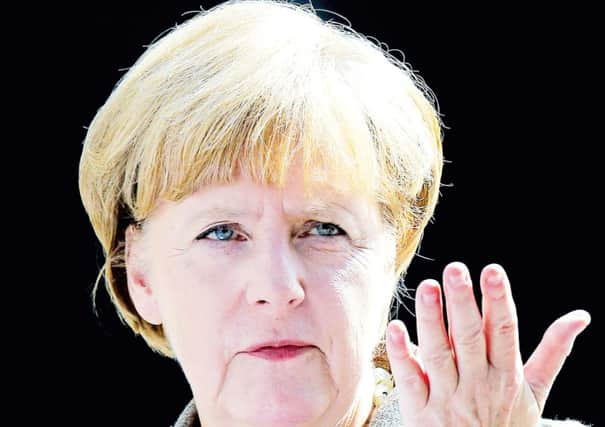Border standoff key to Ukraine peace deal


Merkel visited Kiev yesterday ahead of a meeting next week between the Ukrainian and Russian governments, which diplomats say is the best chance in months of a peace deal in eastern Ukraine.
Ukrainian forces have been fighting pro-Russian rebels for months, with the latter attempting to break away and seek independence or join the Russian Federation. As Merkel arrived, tensions flared up again yesterday.
Advertisement
Hide AdAdvertisement
Hide AdNato has claimed Russia’s military is inside Ukraine helping the rebels, and Moscow angered Kiev and the West by sending a massive aid convoy into Ukraine against Kiev’s wishes.
“There must be two sides to be successful. You cannot achieve peace on your own. I hope the talks with Russia will lead to success,” said Merkel, looking ahead to a meeting on Tuesday involving Russian president Vladimir Putin and his Ukrainian counterpart, Petro Poroshenko.
She said a ceasefire was needed, but the main obstacle was the lack of controls along the nearly 1,300-mile border.
“The Ukrainian side and our European partners will do everything possible to bring about peace – but not at the price of sovereignty, territorial integrity and independence of Ukraine,” Poroshenko said.
Hours before Merkel’s plane landed in Kiev, there was heavy artillery bombardment in Donetsk, the main separatist stronghold in the east of Ukraine, near the border with Russia. Reporters saw apartments destroyed and puddles of blood, where, according to residents, two civilians were killed.
Diplomats say Merkel has two aims for the visit: to show support for Kiev in its stand-off with Russia, but also to urge Poroshenko to be open to peace proposals when he meets Putin next week.
The conflict in Ukraine has dragged Russian-western relations to their lowest ebb since the Cold War and sparked a round of trade sanctions that are hurting already-fragile economies in Europe and Russia. A convoy of about 220 white lorries rolled into Ukraine on Friday through a border crossing controlled by the rebels after days waiting for clearance. Moscow said the convoy moved in without Kiev’s consent because civilians in areas under siege from Ukrainian troops were in urgent need of food, water and other supplies.
Kiev called the convoy a direct invasion, a stance echoed by Nato, the United States, and European leaders.
Advertisement
Hide AdAdvertisement
Hide AdIn Brussels, Nato said it had reports of Russian troops engaging Kiev’s forces inside Ukraine – fuelling western allegations that the Kremlin is behind the conflict in an effort to undermine the western-leaning leadership in Kiev.
“Russian artillery support – both cross-border and from within Ukraine – is being employed against the Ukrainian armed forces,” said Nato spokeswoman Oana Lungescu.
A Ukrainian military spokesman in Kiev, Andriy Lysenko, said Ukrainian forces were coming under fire from Russia, using Grad and Uragan missiles, over a 250-mile length of the border. The Russian foreign ministry called his allegations “groundless”.
The crisis over Ukraine started when mass protests in Kiev ousted pro-Russian president Viktor Yanukovich and installed pro-European Union leaders viewed with suspicion by the Kremlin. Soon after that, Russia annexed the Ukrainian region of Crimea, and a separatist rebellion broke out in eastern Ukraine.
In the past weeks, the momentum has shifted towards Ukraine’s forces, who have been pushing back the rebels.
The separatists are now encircled in their two strongholds, Luhansk and Donetsk.